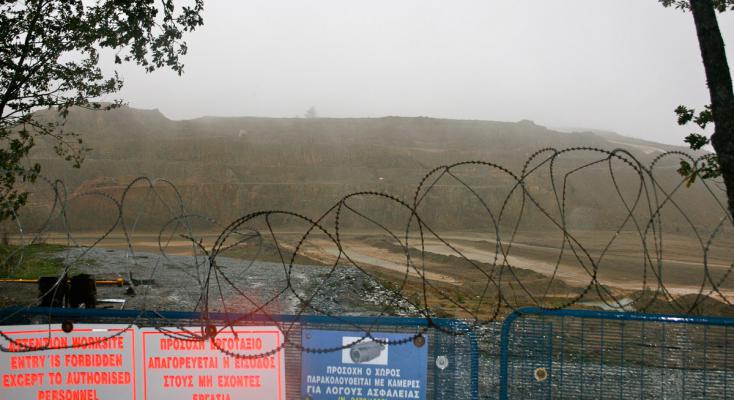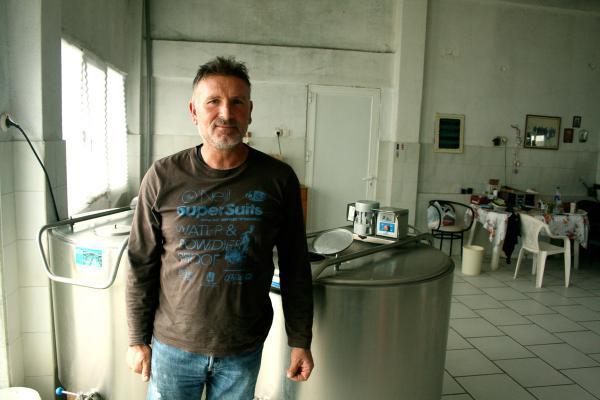Nick Meynen (°1980) is geograaf, conflictdeskundige en auteur van vijf boeken, waaronder Frontlijnen (2017) en De val van Icarus.
CETA reinforces the devastating impact of the Canadian mining industry in Greece
Out of the blue, on a rainy Monday, a glum looking Greek shepherd tells me that CETA will be the final nail in his coffin. This economic trade agreement between Canada and the EU, should have been approved last weekend. The hopes of over a million European citizens, that are opposed to CETA, now lie in the hands of Paul Magnette, minister-president of the Wallonia region in Belgium. For Greece however, it is a matter of life and death.
A lot of Canadian mining giants already enjoy a nasty reputation worldwide. CETA would enable them to exercise the power to establish a similar destructive mining industry in the EU.
In January 2015, when Syriza formed the Greek government, they promised the annulment of planned installation of gold mines, for these mines would destroy the naturally rich Halkidiki region. Hellas Gold, daughter of he Canadian mining corporation Eldorado Gold, was urged to redo its homework for the latest licences. After a year of Syriza in power, Eldorado Gold had to scrap over one billion dollars of expected income, after which their shares plummeted.
Nevertheless, in the spring of 2016 secondary permits were negotiated and obtained via the court of law. The most important permit, however, for the construction of a gold-copper metallurgy factory, is still absent. After twenty months of changing opportunities, Eldorado Gold seems hopeful that the deal can still be pushed through. CETA would pour a truckload of cement over this deal, because it could cost the Greek billions of euros, if after the CETA approval, the mine would fail to get permission to be be established.
Enough poison to kill everyone
Officially the current dispute is of a strictly technical natasure: can Hellas Gold convince the Greek government that ‘flash melting’ is achievable with the ores of Halkidiki? This method, of separating gold from ore as a byproduct from the mining of copper, is a common one and is specified in the contract with the Greek state.
The only other alternative, a technique once used by another Canadian mining company (TVX) that was kindly asked to leave the country, makes use of cyanide. This method was once approved of, but was luckily never used. Eventually the Greek court forbade it, because of its destructive impact on the environment.
The real problem for Hellas Gold? Arsenic. Ores from the planned Skouries mine were to be melted together with the ores of the nearby Olympiada mine, which are rich in arsenic. The process would produce 20.000 ton of arsenic on a yearly basis. The level of arsenic is sixteen times the level that is allowed for ‘flash melting’ in China and almost thirty times above the admitted amount in the EU. The quantity of arsenic that Hellas Gold wants to mine, is enough to give a lethal dose to every human being on the face of the earth. Times three.
It’s a challenge to convince the Greek government that all of this will proceed safely and soundly - not in the least because Hellas Gold has lied to and tricked them before, by means of providing false samples, derived from other locations.
Moreover, a seismological expert from the Aristotle University, also smashed the myth about the so-called earthquake-resistant dam behind which the arsenic was to be gathered. A faultline with an abundance of seismic activity, runs right under the dam. Hellas Gold is already hoarding arsenic from other mines, while it is still constructing the dam.
Putting the carriage in front of the horse, seems to be an approach that has been proven fruitful in the past. A license to install machinery was (ab)used to lay the foundations of a gold factory, to cut down an ample amount of trees and to smooth out hill slopes for instance. During our visit on October 17th we came across big cranes, bulldozers and trucks, making a huge racket, where once bees used to buzz.

‘Asbestos is a slow killer, but don’t forget that it’s coming for you.’
© Nick Meynen
Enough natural resources on the surface of the land
A beekeeper from the nearby Arnaia experienced first hand that the bees in this region aren’t just any bees. His honey was voted ‘best of the world’. The over 1000 beekeepers that live in this area, are an export-economy on their own. This entire sector is now threatened by the mining plans.
The same goes for the many olive manufacturers and the equally important touristic economy.
Giorgios Karinas (41) is such a beekeeper. He survives in Megali Panagia, the village closest to the planned Skouries mine. Giorgios wouldn’t be okay with it, should I have written that he ‘lives’ in Megali Panagia, because his life has been put on hold. “We live in a constant state of insecurity, for many years now. I have bees and I make olive oil, but I cannot invest as long as I don’t know whether or not the mine is coming. If their toxic substances and polluted water ruin this village, will I still be able to sell my honey and olive oil?”
We are given a tour along the beautiful spots with a touristic value and share some, still pure mineral water.
He speaks melancholically about the resistance: “In 2006, 5000 people, which is more than the total population of this village, signed the petition against the mine. During the 2008 crisis however, a lot of people lost their construction jobs. They started working for Hellas Gold. Now, the village is strongly divided. Personally, I’m considering emigration.”
This radical option was shared by many people, although nobody knew where they could go. It’s a sad decision in a wealthy region, provided that wealth is measured by a renewable capital such as forests, bees and beaches.
Along came CETA
Giorgios Vlachos (50) is the most recent shepherd in a long family-line and most likely, he will be the last. A mere twenty years ago, his village Palechori, still housed a dozen or so shepherds who made the praised feta cheese.
A lot of Canadian mining giants already enjoy a nasty reputation worldwide. CETA would enable them to exercise the power to establish a similar destructive mining industry in the EU.
Giorgios: “In this village, the fathers now urge their daughters to marry miners. Unfortunately this village chooses temporary jobs and ignores the asbestos.”
Aside from arsenic the ground is laden with asbestos. Hellas Gold has been able to keep that secret for some time now, until the geological institute confirmed this fact in January of 2016 and made it public. And now everyone knows. In the neighbouring village of Megali Panagia, you are greeted with a banner that reads: ‘Asbestos is a slow killer, but don’t forget that it’s coming for you.’
There are a number of other things that Hellas Gold tries to keep hidden. Giorgios Vlachos recounts the story of what happened to two colleagues with herds close to the Olympiada mine: “Their milk was infused with heavy metals. They could no longer sell the milk to the company of which I personally know the owner. Through him I was informed of the hush money they were paid from Hellas Gold. Shortly after, their herds were bought up by Hellas Gold and now other shepherds are being coaxed into selling off their herds as well.”
All of a sudden this shepherd, in his worn jeans, starts to talk about CETA. The subject was on my questionary, but I had no intention of bringing it up with him.
“If they sign CETA, I’m finished.” My first reaction is: the Greek government tussled over feta cheese with the Canadians, something that Canada wishes to produce on an industrial scale. They reached a compromise. But that is not what Giorgios is referring to. “If CETA is established, then so will the mine. Then I all can do, is just pack up my herd and close the books.”

Giorgos Vlachos: “If they sign CETA, I’m finished.”
© Nick Meynen
State of Exception
Back in the regional capital of Thessaloniki, Maria Kadoglou (48), a woman with over 19 years of expertise in this matter, sheds some light on the subject.
‘It’s a ‘guesstimation’ to know how much compensation they would receive from CETA through arbitration. But look at Romania. The Canadian mining company Gabriel Resources demands 2.7 billion euro from the state, for not allowing the Rosia Montana goldmine. To this end they are using the arbitration with a bilateral trade agreement between Canada and Romania. They didn’t even receive the permission for their environmental effects-report. Hellas Gold claims to spend 700 million euro and the potential profit they say, is around 10 billion euro, so it should be somewhere in between.”
When I ask about any hiatus in my research, Maria points out the European water regulation.
“In the past, you have written about the way in which the trojka degraded the European regulation for environmental effects reporting, to a scrap of paper and how Hellas Gold is capable of avoiding taxes through the use of letter-box companies. The European water regulation was also violated.
The whole of the mining industry region was simply granted a ‘state of exception’, and that was that according to the former Greek government. At the beginning of 2015, WWF Greece filed a report regarding this matter, at the European Commission, but they received no reply.”
The decision of the Greek Minister for Environment, about the usage of ‘flash meltings’ and consequently about the construction of the factory and mine, can be made any day now.
Likewise, the decision regarding CETA, can be made at any minute. Millions of Greeks are holding their breath and many of them are rightly concerned about the loss of sustainable employment, about a necessary emigration and about even more lethal poisoning.
It’s crunch time and somebody will have to crack: Eldorado Gold or “the Giorgios in the street”.
Translation: Fei Lauw
Maak MO* mee mogelijk.
Word proMO* net als 2793 andere lezers en maak MO* mee mogelijk. Zo blijven al onze verhalen gratis online beschikbaar voor iédereen.
Meer verhalen
-
Report
-
Report
-
Report
-
Interview
-
Analysis
-
Report













 Oxfam België
Oxfam België Handicap International
Handicap International